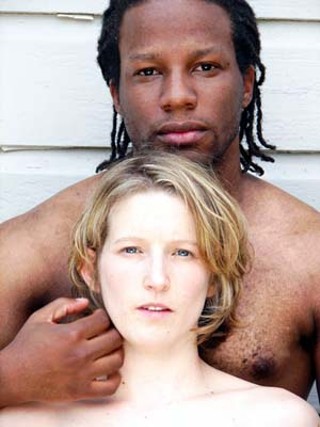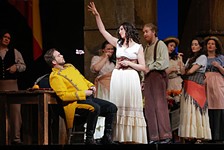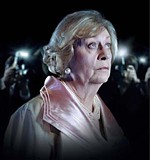Voices Underwater
An entrancing swim through issues of communication, discrimination, and history (with a couple of eerie ghosts along for the ride)
Reviewed by Avimaan Syam, Fri., Nov. 9, 2007

Voices Underwater
Salvage Vanguard Theater, through Nov. 17
Running time: 1 hr, 10 min
Halloween may have passed, but if you head east on Manor Road, the Salvage Vanguard Theater still has a haunted house up for you. That's the setting of Abi Basch's Voices Underwater, an entrancing journey that swims through issues of communication, discrimination, and history (with a couple of eerie ghosts along for the ride, too). The haunted house in question contains three stories. In the present day, Emma and Franklin have traveled down to Alabama to inspect the property that Emma has inherited. Emma is Jewish, Franklin is African-American, and it's hard to tell whether the frostiness between them is long-lingering or set on by their trip. While Emma tries to romanticize their journey, cold and practical Franklin clearly wants no history in a place where his father was once a slave. Also lurking about the attic is the woman who Emma has inherited the house from, in the form of the teenager she was when her father was a Ku Klux Klan leader in the 1920s. And concluding this trio is a young woman who was wounded in the Civil War while posing as a boy so that she could fight.
There's a lot of history in this house, and at first it seems like a place of coincidence is what unites these tales. As the stories are revealed, it's fascinating to see how the ghost stories don't just overlap but interweave with the present tale. They share metaphors, meanings, and actors, too – Emma and Franklin are subverted into servants in the ghost worlds, physically representing how the past still exists within us.
Despite this interaction of the present and the ethereal, there's never any confusion as to which world the play inhabits at any given moment. While the infusion of media and lighting effects surely contribute to the environments, the difference chiefly lies in the four characters on stage. Meg Sullivan stalks about the stage as Jenny, full of a teenager's excitable energy, her language a lively mishmash of poetry, dramatics, and recounts of bigotry. Sullivan's physicality has Jenny caterwauling around the stage but always with purpose; her stop-'n'-go transitions between liveliness and silence are always precise, something she shares with Robin Grace Thompson, who plays Albert. Thompson repeatedly exacts the same pattern of motions while telling her tale, and while they may appear unreal, they're quite compelling. Both Thompson and Sullivan move so purposefully and speak so poetically that the contrast between present and ethereal is quite clear. Sean Tate and Chronicle Arts reviewer Hannah Kenah, the present-day couple, are much terser in dialogue, more compact in motion.
At the beginning of Voices, Emma and Franklin operate in a more concrete, realistic world, quibbling over their work, their trip, the milieu of their relationship. But as they delve further into the house's history, their interaction becomes more abstract, insistent, and metaphorical, while the ghosts' stories become tangible and real as they reach their conclusions, perhaps because they have more impact on the real meaning of the play. In death these souls can expound endlessly on their lives, only there's no one to hear them. Basch's implication that we do the opposite in real life is a chilling thought to consider.
It's worth mentioning that Voices is a visual feast, as well. The set at first seems simple and bare – a canopy bed, a desk, a trapdoor below, and scant else – but this nondescript stage is used as a springboard of movement and devices. Videos of the ghosts are projected on white sheets, candlelight creepily illuminates the room, and the actors are moved up, under, and around the stage, including one ghost traversing above the room while hanging on to the rafters.
It can be strange to conceive of our houses as other people's houses, other families' homes, holding deep meaning for them as well. Voices Underwater manages to fit three relevant stories into one creepy Alabama home, and the wonderful way those tales are intertwined combines with a captivating, energetic production to make this a chilling, meaningful, must-see show.










